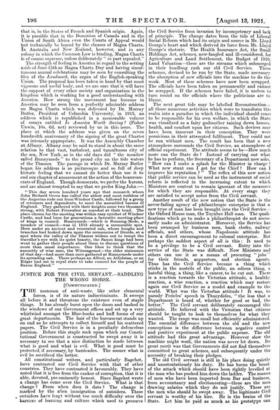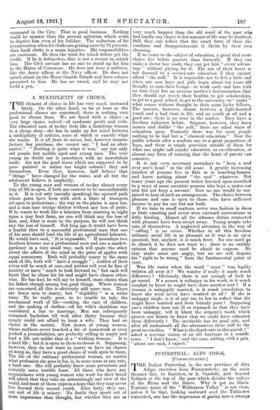JUSTICE FOR THE CIVIL SERVANT.—SADDLING THE WRONG HORSE. [COMMUNICATED.] T HE
monsoon of anti-waste, like other elemental forces, is of its nature indiscriminate. It sweeps all before it and threatens the existence even of staple things. It has already burst open the doors and bashed in the windows of our Government offices and set up a very whirlwind amongst the Blue-books and buff forms of our great departments. The hair of the bureaucrat stands up on end as he attempts to collect himself and his scattered papers. The Civil Service is in a peculiarly defenceless position. Before this staple rock upon which our Consti- tutional Government is constructed be swept away it is necessary to see that a nice distinction be made between what is good and what is evil. What is good must be protected, if necessary, by barricades. The sooner what is evil be sacrificed the better.
All constitutional writers, and particularly Bagehot, have contrasted our Civil Service with that of other countries. They have contrasted it favourably. They have noted that it is free from the canker of corruption, that it is able, devoted, pre-eminently honest. Since Bagehot wrote a change has come over the Civil Service. What is that change ? From when does it date ? The change is marked by the alien immigration of outsiders. These , outsiders have leapt without too much difficulty over the barriers of learning and culture which used to preserve the Civil Service from invasion by incompetency and lack of principle. The change dates from the tide of Liberal Social Reform which had its origin and source in Mr. Lloyd George's heart and which derived its force from Mr. Lloyd George's rhetoric. The Health Insurance Act, the Small Holdings Act, schemes, new-fangled and ill-considered, for Agriculture and Land Settlement, the Budget of 1910, Land Valuation—these are the streams which submerged in their headlong rush our old Civil Service. These schemes, devised to be run by the State, made necessary the absorption of new officials into the machine to do the work. Most of these schemes have now been scrapped. The officials have been taken on permanently and cannot be scrapped. If the schemes have failed, it is useless to turn round on the officials where the politicians are to blame.
The next great tide may be labelled Reconstruction— all those numerous activities which were to transform this realm into a paradise in which the individual should cease to be responsible for his own welfare, in which the State was visualized as a fairy godmother raining down houses, health, and comfort upon her citizens. Such devices may have been innocent in their conception. They were pernicious in their attempted fulfilment. They could not be run without men. The result has been that a new atmosphere surrounds the Civil Service, an atmosphere of official experiment. The attitude seems to be—How much more can the State do ? Instead of carrying out what he has to perform, the Secretary of a Department now asks, " How can I make a splash for the Minister in charge ? What new stunt can I get for the Chief ? How can I improve his reputation ? " The reflex of this new notion that public service can be used as the instrument of social reform is reflected in the increasing extent to which Ministers are content to remain ignorant of the measures for which they are responsible. At every stage they are satisfied to accept notes from the Civil servant. Another result of the new notion that the State is the never-failing agency of philanthropic enterprise is that a new type of man has been brought into the Civil Service— the Oxford House man, the Toynbee Hall man. The quali- fications which go to make a philanthropist do not neces- sarily make an administrator. Moreover, the Service has been swamped by business men, bank clerks, railway officials, and others, whose Napoleonic attitude has been a direct encouragement to colossal enterprise. But perhaps the saddest aspect of all is this : It used to be a privilege to be a Civil servant. Entry into the service of the State was difficult. Now Ministers and others can use it as a means of procuring " jobs " for their friends, supporters, and election agents. Thus has the Civil Service become a thing which stinks in the nostrils of the public, an odious thing, a hateful thing, a thing, like a cancer, to be cut out. There is a reaction towards the Victorian attitude, a healthy reaction, a wise reaction, a reaction which may restore again our Civil Service as a model and example to the world. What was the Victorian attitude ? It was, to parody Pericles' speech in Thucydides, " the leas that a Department is heard of, whether for good or bad, the better." The Civil servant deliberately encouraged this attitude. He believed with the Victorian that citizens should be taught to look to themselves for what they wanted. The range was small but efficiently administered. The essential difference between the old and the new conceptions is the difference between negative control and positive experiment at the public expense. The old attitude had this great advantage. However slow the machine might work, the nation was never let down. Its great merit was that Governments did not find themselves committed to great schemes, and subsequently under the necessity of breaking their pledges. The old Civil servant is still in his place doing quietly and unostentatiously his duty. He has borne the brunt of the attack which should have been rightly levelled at the man who has pushed him down the ladder. The masses of men who have been imported from Bar and business, from accountancy and electioneering—these are the men drawing salaries which they do not justify. These are the men who should be swept away. The legitimate Civil servant is worthy of his hire. He is the brains of the State. Let him be paid as much as his prototype can command in the City. That is good business. Nothing could be meaner than the present agitation which seeks to deprive him even of his holiday. The reduction of his remuneration when his clerks are getting more by 75 per cent. than bank clerks is a mean injustice. His responsibilities are enormous. He does the work for which others get the credit. If he is defenceless, that is not a reason to attack him. The Civil servant has no one to stand up for him in the House of Commons. He does not wear a uniform, like the Army officer or the Navy officer. He does not splash about on the Horse Guards Parade and have colours presented to him. He has no sword, and he may not wield a pen.



































 Previous page
Previous page